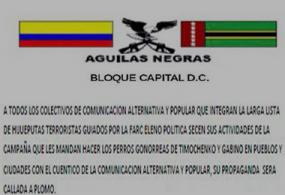This morning, a pamphlet from the paramilitary group Aguilas Negras (Black Hawks) circulated by email, this time threatening the death of journalists, communicators, and members of popular media agencies and groups, including Colombia Informa. A couple days ago, they also threatened Canal Capital, Telesur, and Reporteros Sin Fronteras. This strategy of terror that uses the force of repetition and abruptness, does not achieve the desired effects. Instead, it reinforces the networks of denouncement and solidarity.
“To all of the collectives of alternative and popular communication that make up the long list of motherfucking terrorists guided by the FARC-ELN politic, stop your campaign activities that the fucking bastards Timochenko (of the FARC) and Gabino (of the ELN) send you to do in the towns and cities with the stories from the alternative and popular media; your propaganda will be silenced with force.”
That is the beginning to a long text which takes up two pages, that does not hide people’s full names and mentions the popular medias, and invariably links them to the insurgent organizations that have been involved in the peace processes. In each case there are threats of death.
A week ago, a missive signed by the same paramilitary group was circulated, this time threatening journalists and workers from the public access television channels like Telesur and Canal Capital, and the international organization Reporteros Sin Fronteras.
The Aguilas Negras, similar to other remaining groups of paramilitary activity, often act with their strategy of intimidation against whatever social or political expression that engages in a critique of the warmongering framework that, in the last few years, has been questioned by growing sectors of society that support the peace talks. During the electoral campaign they directed their threats at the political candidates of Unión Patriótica (Patriotic Union) and Polo Democrático Alternativo (Alternative Democratic Pole), during the agrarian strikes these threats were directed towards peasant groups and leaders, and when there is the occasion of university debates, they direct them at the student movement.
In this case, the distinct journalists and medias that were threatened have been processing and working on adequate precautionary mechanisms, such as how to make this new threat known to the Fundación para la Libertad de Prensa (Foundation for the Liberty of the Press), and other international denouncements.
This article took special precautions not to reproduce the full text from the pamphlet in order to preserve the names of the people and medias that were mentioned, as the collective denouncements and collective action is pending.
As Colombia Informa we are coming together to amplify the networks of denunciation. We are convinced that these acts, echoes of systematic violence that for decades had exercised power against the people, has far from intimidated, rather it had the opposite effect. It has reinforced the links of solidarity and unity amongst those in communication or whatever social discipline, who know that we are part of a people who forges their destiny with hope and dignity.
